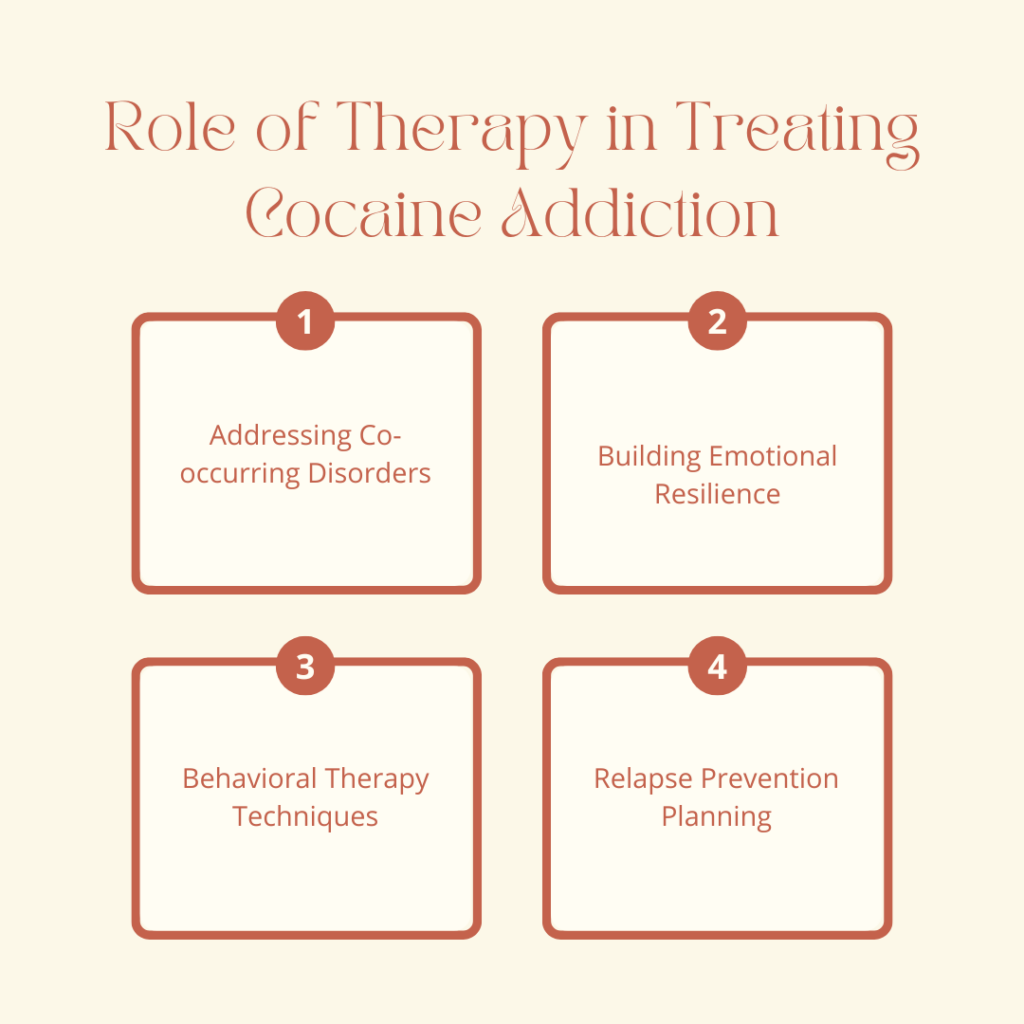Cocaine is a powerful stimulant drug that has significant effects on your body and mind. While it might provide a temporary feeling of euphoria, increased energy, and confidence, the long-term impact on your mental health can be devastating. Understanding how cocaine affects your brain and mental health is crucial for recognizing the need for professional help, like CBT Therapy in Boca Raton, Florida, and other specialized treatments.
How Cocaine Affects the Brain
Cocaine directly impacts the brain’s reward system by increasing dopamine levels, the chemical responsible for feelings of pleasure and satisfaction. However, this surge in dopamine is unnatural and unsustainable, leading to a cycle of intense highs followed by severe lows. Over time, this disrupts normal brain function, causing cravings, mood swings, and emotional instability.
Mental Health Disorders Linked to Cocaine Use
Cocaine use can trigger or worsen various mental health disorders, including:
- Anxiety Disorders: Cocaine can cause severe anxiety, panic attacks, and paranoia, making everyday situations feel overwhelming.
- Depression: After the high wears off, many individuals experience extreme sadness, hopelessness, and irritability. This can lead to a dangerous cycle of using cocaine to escape negative feelings, which only worsens the underlying depression.
- Bipolar Disorder: Cocaine use can intensify the mood swings associated with bipolar disorder, making episodes of mania and depression more frequent and severe.
Anxiety and Panic Attacks
One of the most immediate and distressing effects of cocaine use is the exacerbation of anxiety. As the initial high fades, users frequently report feelings of jitteriness, paranoia, and overwhelming worry. The body’s physiological responses can amplify these feelings, leading to rapid heartbeats and sweating, which can spiral into full-blown panic attacks. These moments of acute anxiety can be terrifying, often leaving individuals feeling isolated and vulnerable even in familiar settings.
Depression and Mood Swings
The rollercoaster of emotions does not stop with anxiety. After the euphoric high, many users plummet into a deep state of depression, marked by pervasive feelings of sadness and hopelessness. This emotional drop can occur as soon as the drug’s effects subside, creating a cycle where individuals feel compelled to use cocaine again to escape their low mood. These mood swings can become more severe and frequent, making daily life increasingly challenging and unpredictable.
Increased Risk of Psychosis
For some, particularly those who engage in heavy or prolonged use, cocaine can trigger psychosis—a severe mental health condition characterized by hallucinations, delusions, and disordered thinking. Imagine feeling as though you are being watched or hearing voices that aren’t there; these experiences can be both frightening and disorienting. The risk of psychosis is heightened for those with existing mental health disorders, making it essential for individuals to be aware of these dangers.
The Role of Therapy in Treating Cocaine Dependence
- Cognitive Behavioral Therapy (CBT): CBT Therapy in Boca Raton, Florida, is highly effective for treating cocaine dependence. It helps individuals identify and change negative thought patterns that contribute to drug use. By learning coping strategies and how to manage triggers, patients can break free from the cycle of dependence.
- Dialectical Behavior Therapy (DBT): DBT, offered at Dialectical Behavior Therapy Centers, focuses on emotional regulation and mindfulness. It teaches individuals how to handle stress and emotional pain without turning to cocaine.
- Group Therapy Services: Group therapy offers a supportive environment where individuals can share their experiences and learn from others facing similar challenges.
Long-Term Mental Health Consequences
The long-term impact of cocaine on mental health can be profound and far-reaching. Chronic use leads to alterations in brain chemistry that can result in persistent changes in mood, behavior, and cognitive function. The initial euphoric effects give way to dependency, where individuals feel they need cocaine to function normally or feel pleasure. This dependency can create a cycle of anxiety and depression, as users find themselves trapped in a downward spiral.
Co-occurring Disorders
Cocaine dependence often doesn’t exist in isolation; many individuals battling dependence also face co-occurring mental health disorders such as anxiety disorders, major depression, or post-traumatic stress disorder (PTSD). These dual diagnoses complicate the treatment process, as both the substance use and underlying mental health conditions need to be addressed simultaneously. Failing to do so can hinder recovery and exacerbate symptoms of both dependence and mental illness.
Structured Programs for Recovery
- Partial Hospitalization Program (PHP): Partial Hospitalization Program is a structured program that provides intensive care without requiring a hospital stay. It is ideal for those needing constant support while still being able to live at home. PHP combines various therapeutic approaches, including individual therapy and group sessions, to address the complexities of dependence and mental health.
- Intensive Outpatient Program (IOP): The Intensive Outpatient Program is a flexible option for those who need significant support but cannot commit to a full-time program. IOP allows patients to receive treatment during the day while maintaining work, school, or family responsibilities. This program often includes CBT, DBT, and other therapeutic techniques tailored to individual needs.
Taking the First Step Towards Healing
At Archway Behavioral Health, we offer a holistic approach to treatment, recognizing the complex interplay between substance use and mental health. Our compassionate team is dedicated to creating personalized treatment plans that address each individual’s unique needs, fostering an environment of support and healing.
Recognizing the impact of cocaine on mental health is the first step towards recovery. If you or someone you love is struggling, seeking help from a mental health treatment center can provide the support needed to regain control. Services like individual therapy, group therapy, and structured programs such as PHP and IOP can help guide you through the recovery process.
Reaching out for help can be daunting, but mental health treatment services are designed to support you every step of the way. Whether through CBT Therapy in Boca Raton, Florida, or group therapy services, there are resources available to help you rebuild your mental and emotional health.
Conclusion
Cocaine may promise temporary pleasure, but its long-term effects on mental health can be devastating. By understanding the risks associated with cocaine use, individuals can make informed choices and take proactive steps toward recovery. If you’re ready to begin your journey to mental well-being, contact Archway Behavioral Health today, call us at (888) 488-4103. Let us guide you toward a healthier, happier future—one step at a time.
FAQs About Cocaine and Mental Health
What is cocaine, and how does it affect the brain?
Cocaine is a powerful stimulant derived from the coca plant. It affects the brain by blocking the reuptake of dopamine, a neurotransmitter linked to pleasure and reward. This leads to an intense feeling of euphoria, increased energy, and alertness. However, these effects are temporary and can be followed by negative emotional states.
What are the short-term effects of cocaine use?
Short-term effects include heightened euphoria, increased energy, improved focus, and decreased appetite. However, users often experience anxiety, paranoia, and irritability as the drug’s effects wear off. The “crash” can lead to fatigue and depression.
How does cocaine contribute to anxiety and depression?
Cocaine can exacerbate anxiety by overstimulating the nervous system. When the drug wears off, users may experience severe mood swings, leading to feelings of depression and hopelessness. This cycle can create a reliance on cocaine to escape negative emotions.
Can cocaine cause long-term mental health issues?
Yes, chronic cocaine use can lead to lasting changes in brain chemistry, resulting in persistent mental health issues such as anxiety disorders, depression, and even psychosis. These long-term effects can significantly impact daily life and relationships.
What is cocaine-induced psychosis?
Cocaine-induced psychosis occurs when heavy use leads to symptoms such as hallucinations, delusions, and disorganized thinking. This condition can be frightening and may require immediate medical attention.
How are cocaine dependence and mental health disorders related?
Many individuals who struggle with cocaine dependence also face co-occurring mental health disorders. These can complicate treatment, as both the dependence and underlying mental health issues need to be addressed for effective recovery.



